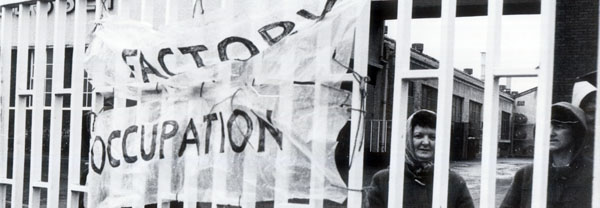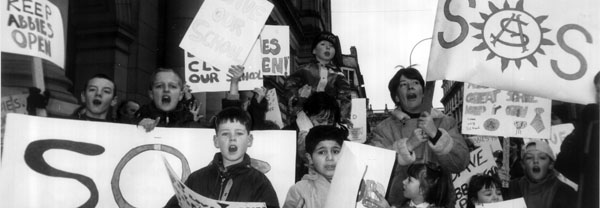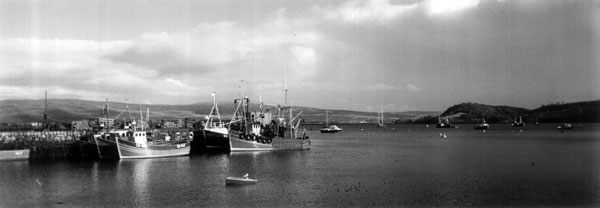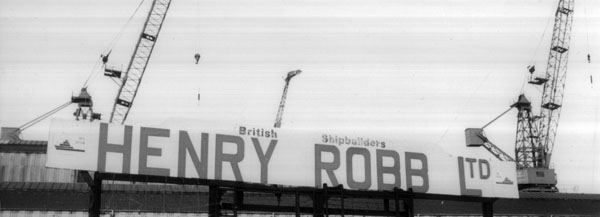A MAJOR PRIZE FOR THE European Union in its quest to kill nation states and create a Europe
of regions would be the first ever secession of a major portion of one of its member states. Yes, it's Britain – on course for this treatment as the Labour "war" Party gives up the ghost and connives with separatists who pledge to ballot for Scottish independence on winning a sufficient mandate at the next Holyrood elections for the devolved Parliament in May 2007.
Who will suffer?
Whose vital interests do not coincide with this push? Yes, it's us – those who work and live in Britain, who only by deeper unity can resist the globalised intensification of exploitation, led by the EU and the USA, which lowers our standards, degrades our culture and denudes us of our popular sovereignty.
For over three decades Workers has argued intensively against this break up of Britain. The urge for separation in Scotland and Wales came in spasms as things in Britain went bad, particularly during the Thatcher years and now – in many ways worse – during the Labour years. The expensive path of opting out from the bad dream was taken, in the form of a Scottish Parliament.




|
A history of industry and working class struggle (from top): factory occupation at Plessey, Bathgate, 1982; protest against school closures, City Chambers, George Square, Glasgow, 1993; fishing fleet, Mull; Robb Shipyard, 1981.
Photos: Workers
|
A slow wake-up call
But seven years of growing disillusion-ment is a slow wake-up call. A massive jolt came from the brave and tireless campaign at the grass roots level that defeated the Labour and European Union attempt to impose a Regional Assembly on the north east of England in 2003.
The fact that the People's Campaign Against the Euro Region could decisively rout the European Union and its many major supporters (including trade unions in the north east) gives inspiration to the thought that separatism in Scotland can also be rolled back. Even if after next May, the Scottish National Party (SNP) and its motley crew of allies in Labour, the Scottish Socialist Party, Scottish Green Party and the Scottish Trades Union Congress (STUC) do launch a referendum on "independence for Scotland" we can look forward to fighting it and defeating the proposal decisively.
Working people increasingly despise politicians – hate being fleeced and taken for dupes by them.
Conflict over oil?
As people drop out or seek to opt out from Labour's privatised "war-footing" Britain, the party's long-established political monopoly in Scotland is crumbling. As its strategists say, its "polling position is bleak – a major concern".
With forthright statements against the NATO attack on Yugoslavia and condemning war in Iraq, the SNP leader Alex Salmond has seduced many wavering trades union and Labour members into the euphoria of his campaign for a brave, new, capitalist Scotland. Going almost unremarked are his unequivocal statements over several years on the benefits of EU membership, and now his pledges that Scotland would change to the Euro after independence. Enticing promises on Council Tax and to pensioners, coupled with bravado on the seizure of North Sea oil reserves make titillating reading.
But the unstated reality begs the questions: Who actually owns and controls the oil? On breaking with London, who is Salmond now pledging allegiance to? A short answer might be global capitalism, the European Central Bank, Brussels.
A sensible warning to make at this stage would be: remember peaceful Yugoslavia's descent into civil war and break up into the petty statelets of the Balkans. An EU plan? It is also worth taking a look at how our fellow working classes in Spain, France and Italy dealt with separatism in the form of Catalan, Galician, Breton and Northern League nationalism.
Remember, too, break-up by default; where was the referendum when the Czechoslovak state dissolved in 1993? Evidence shows now that unity was the desire of its people then. Beware of those on "the left" who hold their own version of a public debate, announce a "progressive consensus" and then proclaim the "settled will of the Scottish people" (the favourite phrase of John Smith, Donald Dewar – and now the Tory, Cameron).
Free from US and EU
With more than enough fire power dug into the loch sides and hardened airfields to wipe out humanity, an independent Scotland – with a rump of Labour and Tory not far from power – could opt to keep its nuclear armaments. A forward US base for over half a century – and one that is ripe for enhancement – it is caught between a militarising EU and a USA ambitious to expand.
Just look who Salmond and Holyrood's First Minister are marching with on the farcical New York parades on Tartan Day (now institutionalised by the US Senate)! Just over 30 years ago, Edinburgh received a new US consul. His name was Funkhauser. He had previously been Kissinger's adviser on oil strategy, was a "counter subversion" expert in Vietnam and an experienced Central Intelligence Agency agent in Europe.
Funkhauser's cryptic remarks at the time can now be better understood: that on the future of Scotland depends "the future of Western industrial life. Scotland is where the action is. It is towards Scotland that the forces are converging that will determine the outcome."
Now, only through unity can we as a class determine that outcome, by preventing the increased US domination of a separate Scotland. The final freeing of ourselves from an enfeebled US predator has to be combined with the task of nationally liberating ourselves from the European Union.
The warning given then of "Devolution today, separation tomorrow, annexation the next" has echoed down the decades. It could now become a reality and we alone can bring the process to a halt. Only then can we build a united Britain, harness resources and begin building a future. Labour and the SNP, going down with a desperate and declining capitalism, are blocking the way.
|
1869: Britain's first US-owned factory
|
Scotland's first big experience of global capitalism came in 1867 when the mass production lines of the Singer Sewing Machine company of the USA set up in Clydebank. It was the beginning of an era in Britain. (Surprise, surprise, they left for Taiwan in 1980, creating a ghost town. A worker at the time described it as completing the job Hitler could not finish.)
However, a century of working class experience was gained and was influential nationwide. The owners' insult that they had employed "trained gorillas" had earlier infuriated workers there. The factory became the largest in the world by 1911 and their rush to maximise profit around those years resulted in a strong fight back. It was unskilled women workers who led the rest of the 8,000 out on strike, achieving unionisation in the course of the action. Local anger was
then harnessed into a Britain-wide struggle.
Historians point to World War I as bringing women into industry but for many years before, the primary employment in Clydebank for women was engineering. It was that spark from Singers that led on to actions by seamen and dockers, coal miners, carters, Dundee jute workers, rail workers and Aberdeen quarrymen in the years leading up to 1914.
|
Building a historic unity
Regionalism, separatism, petty nationalism – all were made redundant by the Industrial Revolution, the demise of feudalism and the forging of a nation of workers who looked out for each other, who were determined to fashion a new and better world by their own power, efforts and inventiveness. The historic process created during the Renaissance, the Enlightenment and subsequent leaps in scientific thought, created our modern secular society with its rich tapestry of culture.
We can be proud of the united class that arose, capable of defending itself, with great potential for progress. The futile attempt to restore the old Catholic, feudal monarchy was finally buried at Culloden in 1745 in the last battle on British soil. Thereafter it was the onslaught of capitalism that was felt in equal measure from the east end of London to the east end of Glasgow, from the shooting of the Calton weavers to the transportation of the agricultural workers of Tolpuddle, from the fish gutters of Orkney to the tin miners of Cornwall.
And on, right up to the present: many heard the recent BBC Radio documentary (Knocking Down the Past, 4 December 2006) exploring an exchange of experiences between tenants of the Gorbals in Glasgow's south east and those from the Market Estate in north London. Both groups had demanded – and achieved – demolition of their high-rise slums and rebuilding of the estates. On visiting the London estate a Gorbals delegate emphasised "many of the problems are exactly the same".
As well as in the countryside, the urban areas of Britain share a remarkable amount of common experience. Just think of the common heritage of songs and humour of say, Glasgow and Newcastle, Aberdeen and Liverpool.
Once separatism is defeated, progress can be made in deepening unity – STUC, Welsh TUC and TUC moving closer together, a common football league, British teams at international competitions (rejected for the 2012 Olympics!) could be among hundreds of consequences. And the recent years of struggle to maintain public-sector housing stocks has also garnered common experience – from Birmingham in 2002 to the recent rejections of housing stock transfers in Edinburgh, Stirlingshire, Renfrewshire and Highlands.
Never separatist
The unity we speak of has been forged over centuries. We could even look back to our first popular resistance movement – the Boudiccan revolt against Roman invasion and occupation leading up to the year 62AD. This spread to the Grampian Mountains where the Roman advance was halted 22 years later.
The speech assigned to the leader Calgacus by the historian Tacitus was the first clear definition of imperialism, condemning the enslavement by the Empire and containing the famous description "they created a desolation and called it peace".
Petty squabbles were eventually set aside as the "Marriage of the Thistle and the Rose" (James IV and Margaret Tudor) in 1503, accompanied by a treaty pledging "perpetual peace", paved the way (via the Battle of Flodden) for the Union of the Crowns (James VI of Scotland becoming James I of England in 1603). This led on to the union of the English and Scottish governments in 1707 (in the teeth of separatist scorn), an event to be commemorated during this 300th anniversary.
Following treaties and votes dissolving both Parliaments the union creating Britain became law on 1 May 1707. An added benefit for Scotland was its rescue from near bankruptcy following its disastrous attempts to become a colonial power by seizing the Darien peninsula (now known as Panama) in the 1690s.
The Royal Bank of Scotland – set up largely to acquire funds to reimburse the creditors – remains a powerful force to this day with a £26 billion turnover and a 5 per cent stake in the Bank of China. A full role in Empire followed – just read about the Scots behaviour in the Indian Mutiny, the Opium Wars etc.
But it was the forging of a single working class during the centuries of industrial revolution that really made the nation and its future potential.
By the 1730s in the east end of Glasgow the first associations of weavers started to form and link into a common culture of resistance throughout Britain. Organising defence against intensive exploitation continued apace, from the Glasgow Association of Cotton Spinners in 1820 to the convening of the first ever delegate conference of trades unions called by the Glasgow Trades Council in 1864 – all well documented by the People's Palace Museum in Glasgow Green.
Most of this energy and power to change the world was gradually manoeuvred into safe channels. And with their absorption into the Labour Party, a cosy "living within capitalism" outlook evolved and persisted for generations, especially in Scotland.
Others like John MacLean propounded revolutionary ideas (even being appointed as the first Bolshevik consul) but ended up – broken by imprisonment – in a cul-de-sac of separatist ideals. Some resisted bravely but despite the defying of the World War I Munitions Act and Churchill's tanks (sent against strikers in Glasgow's George Square, 1919), the establishment's fear of proletarian revolution receded.
Those acts of resistance by workers were never separatist. The Defence of The Realm Act struck hard in 1916-18 at workers in Sheffield, Newcastle and Glasgow; and from Petrograd to Clydeside, skilled metal workers were at the core of the movement in those years – but Scots workers were closely coordinated with workers in Tyneside, Sheffield, Manchester and Coventry.
Looking now at the last 35 years of class struggle we see that all the important actions in Scotland have been strongly part of, or assisted by, Britain-wide solidarity.
Think of the occupation, work-in at Upper Clyde Shipbuilders (UCS) in 1971. It indeed did become a prototype for the next 30 years: Plessey's (Alexandria 1971), McNeil's Engineering (Glasgow 1972), Robb Caledon Shipyard (Dundee 1981), Plessey Bathgate (1982 with Plessey Liverpool in solidarity), Timex (Dundee 1983), Caterpillar (Uddingston 1987), Kvaerner Engineering (Clydebank 2000). Many actions revealed strong national coordination; for example the successful strike of the six BBC orchestras (Musicians Union 198O) and the Miners Strike of 1984 (with great cooperation between the strong National Union of Mineworkers presence in Kent, Wales and Scotland).
And right up to date actions continue – the brief but decisive occupation of the Simclar electronics manufacturing factory in Kilwinning in February brought national attention to the constant leaching of skilled jobs to lower-wage countries and the severe decline of the once trumpeted sunrise electronics industries of Silicon Glen.
 |
The People's March For Jobs, led by the pipe band, George Square, Glasgow, 1983
Photo: Workers
|
EU plans
The Labour Party in Scotland has no interest in such proud histories of struggle, nor in a resurgent class creating a new industry for a future Britain. Obsessed with running capitalism (badly!), meddling endlessly in the minutiae of people's lives, trying to control the arts and constructing an independent foreign policy (taking Malawi under their wing and parading through the avenues of New York, for example), they are taking Scotland towards an abyss of separatism.
Scottish Labour are kowtowing to the European Union on industrial contracts (for example, CalMac and shipyard contracts being allowed to go to Poland) and on the biggest piece of regionalisation ever to threaten Britain – devolution. They are now in no shape to resist SNP pressures to push well beyond this towards the continued break up of our nation.
As Alex Salmond dreams of seizing "a future boost to Scotland's balance sheet of £65 billion" in oil revenues and "a £1 trillion asset for our future" in possible discoveries, Labour fumbles for arguments, failing to counter SNP campaigning.
In 2002 it was revealed, under the 30 year rule, that the Foreign Office had produced a confidential paper in 1971, a year before joining the European Economic Community, outlining even then the 12 regions to be created in Britain by the European Commission – and planning began in 1965. It was a precondition for European Development Fund distributions. This led to the founding of the Scottish Development Agency, a precursor to devolution. The Scotland Act paved its way in 1978. Voting on it seems to have been merely a nicety along the road!
Long term planning or what? Will we find the break up of Britain in still-to-be-revealed confidential papers too? It all goes to show the seriousness of the task to finally defeat such ideas. And only workers – united – can carry out that task.




